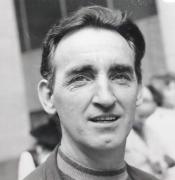 Dominic Behan (22 October 1928 - 3 August 1989)(Gaelic: Doiminic Ó Beacháin) was an Irish songwriter, short story writer, novelist and playwright who wrote in both Irish and English. He was also a committed socialist and Irish Republican. Born into a literary family Dominic Behan was one of the most influential Irish songwriters of the 20th Century.
Dominic Behan (22 October 1928 - 3 August 1989)(Gaelic: Doiminic Ó Beacháin) was an Irish songwriter, short story writer, novelist and playwright who wrote in both Irish and English. He was also a committed socialist and Irish Republican. Born into a literary family Dominic Behan was one of the most influential Irish songwriters of the 20th Century.
Behan was born in inner-city Dublin into an educated working class family. His father was Stephen Behan, who fought for the Irish Republican Army (IRA) in the Anglo-Irish War.mother took them on literary tours of the city. Behan's maternal uncle, Peadar Kearney, wrote "A Soldier's Song", the song the Irish National Anthem was based on. At the age of thirteen, Behan left school to follow his father's footsteps in the housepainting business.
In 1937, the family moved to a new local authority housing scheme in Crumlin. Here, Behan became a member of Fianna Éireann, the youth organization of the IRA and published his first poems and prose in the organization's magazine Fianna: the Voice of Young Ireland. In 1952, Behan was arrested in Dublin for leading a civil disobedience campaign in protest against the ruling government's failure to tackle critical economic issues including unemployment. Behan was subsequently jailed for his part in other campaigns protesting the government's treatment of the working class in Ireland.
On release from gaol Dominic Behan married Josephine Quinn, the daughter of John Quinn, a cabinet maker from Glasgow. The Quinns were active in the Communist Party and other left-wing organisations in Glasgow. They emigrated to England where Behan worked for the BBC, writing radio scripts, mainly for the "Third Programme". His play Posterity Be Damned, produced in the Gaiety Theatre, Dublin, in 1959, dealt with republican activity after the Civil War of 1922–23. An autobiographical novel "Teems of Times" (1961) was received to critical acclaim, particularly by Kenneth Tynan. A biography of his brother, Brendan Behan, appeared in 1965, My Brother Brendan.
During the 1960s and 1970s Dominic wrote a number of television plays for British television in showcases such as "Play for today" and "Armchair Theatre". One of these plays, "The Folk Singer" (1972), was restructured for the theatre and presented during the height of the troubles at Belfast's Lyric theatre.
Arguably, it was as a songwriter that Dominic excelled. His songs became popular among the Irish living in England, especially The Patriot Game, McAlpine's Fusilers, Avondale, The Merry Ploughboy, Famine Song and Liverpool Lou. Teems of Times was dramatized in the early 80s on television by RTÉ.
Dominic died at home in Glasgow, aged 60, on 3 August 1989 of pancreatic cancer, shortly after the publication of his critically acclaimed novel "The Public world of Parable Jones". He was survived by his widow, and two sons, Fintan and Stephen. He was cremated, his ashes being scattered at the Royal Canal, Dublin near his birthplace by his longtime friend Seán Garland, General Secretary of the Workers' Party of which Dominic Behan had been a staunch supporter for many years.
Behan had more than 450 songs published during his lifetime, which does not include works which were not published.
en.wikipedia